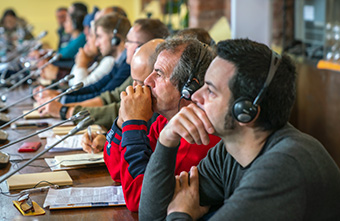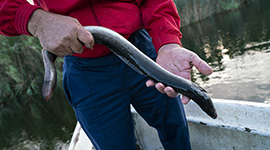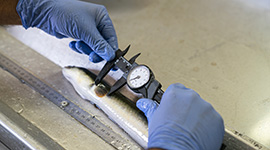Coordinated management plan aims to promote the recovery of the European eel population in the Mediterranean

The future of the European eel (Anguilla anguilla), an iconic fish species, also much appreciated in Mediterranean cuisine, is currently at risk. But a management plan that includes a partial closure of eel fisheries each year, a complete ban on recreational eel fishing, and the setting-up of a monitoring network to identify effective management measures could help reverse the situation.
Eels are critically endangered and face threats such as climate change, habitat loss, pollution and overfishing all along their migration routes, which originate in the Sargasso Sea and span a distribution range from the Mediterranean to northern Europe. In 2020, the migration of young European eel to freshwater habitats, a crucial stage in their lifecycle, reached an all-time low.
 ©GFCM/Claudia Amico
©GFCM/Claudia Amico
The General Fisheries Commission for the Mediterranean (GFCM) of the Food and Agriculture Organization of the United Nations (FAO) responded to the situation and pioneered a comprehensive research programme in nine Mediterranean countries between 2020 and 2022.
The outcomes of this work, published in the report European eel in the Mediterranean Sea: Outcomes of the GFCM research programme, provide a detailed overview of eel fisheries, habitats, and the biological and ecological features of local stocks. The report also offers a comprehensive look at the current management and conservation measures and performs a model-based appraisal of the core measures.
The report identified lagoons as a crucial habitat for eels in the Mediterranean Sea. However, lagoons face substantial challenges, including climate change, fishing pressure and pollution.
Habitat loss, poor water quality and pollution are also evident in other eel habitats, such as rivers and estuaries.
The research also found that despite the numerous fisheries management measures in place, some of them such as closure periods and bans on fishing of certain stages showed poor harmonization and were often insufficiently aligned to local conditions, reducing their efficiency.
The decline of eels impacts fishers as catches have exponentially decreased.
"Before me, my father and grandfather used to fish here. We all fish to make a living. Unfortunately, now we fish very little. We used to fish a lot," said Adriano Deiana, an eel fisher in Sardinia, Italy.
The declining resource is also resulting in fishers leaving their jobs, with subsequent losses in the traditional knowledge, management and environmental stewardship that fishers themselves were providing.
A coordinated management plan for recovery
The dire situation underlines the need for action on multiple levels.
“The European eel, the habitats that host its different life stages and the livelihoods it sustains require action and protection on all fronts: biological, environmental, socioeconomic,” said Elisabetta Betulla Morello, one of the editors of the report and a GFCM Fishery Resource Officer. “Cooperation is essential for identifying and implementing adequate measures, not only to manage fisheries but also to protect the environment and the socioeconomic setting revolving around this species,” she added.


©GFCM/Claudia Amico
Starting with the transitional measures already in place since 2021 and based on the results of the research programme, in 2022 the GFCM adopted a multiannual management plan for European eel in the Mediterranean Sea. It includes a partial closure of eel fisheries for six months each year, with alternative options for its implementation. It also imposes a total, permanent ban on recreational fishing of European eel at all stages – glass eel, yellow eel and silver eel, and in all habitats – freshwater, brackish and marine. These measures were reinforced in 2023 with additional precautionary measures for the protection of glass eels.
Another key part of the plan is to set up a monitoring network involving fishers and scientists across the Mediterranean, in order to identify effective management measures, tailored to specific situations and implemented by all stakeholders. Workshops have already brought fishers, scientists and administrators together, sharing case studies and best practices, with a view to replicating them elsewhere.
Exploring socio-economic impacts: the second phase of the research programme
A socio-economic study forms part of the research programme’s next phase, which will also expand the existing habitat databases and collect information to appraise management measures.
The ultimate goal is to ensure the conservation of the species and the preservation of the heritage of artisanal fisheries within Mediterranean coastal communities.

.jpg)